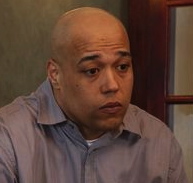 Photograph by John Hickey/Buffalo News On November 11, 2004, 25-year-old Miguel Camacho and his 36-year-old brother Nelson Camacho were gunned down in Buffalo, New York. Police believed the killings were drug-related.
Several days later, police said 22-year-old Josue Ortiz flagged a police car and declared that he had committed the crime. He was taken to a police station and confessed to the crime.
Ortiz was charged with the murders and pled guilty to two counts of first-degree manslaughter in Erie County Circuit in 2006. The plea came after lengthy court proceedings about Ortiz’s mental competency because he had been diagnosed with schizophrenia and bipolar disorder. He was sentenced to 25 years in prison.
In 2012, the case against Ortiz came under question when a re-investigation by the New York State Police and the FBI resulted in federal prosecutors charging three gang members—Brandon Jonas, Efrain “Cheko” Hidalgo and Misael Montalvo—with the same murders that Ortiz pled guilty to. Hidalgo and Montalvo, according to federal prosecutors, admitted their roles in the killings. Investigators learned that the murders were committed as part of a drug ring’s operation in Buffalo.
Initially, the Erie County District Attorney’s Office did not believe that the evidence exonerated Ortiz because evidence suggested four men were involved—three who were seen running from the scene and Montalvo, who said he waited in a car during the shooting.
John Nuchereno, attorney for Ortiz, began investigating and ultimately was able to persuade an Erie County Supreme Court judge to order a hearing on a post-conviction petition for a new trial. However, before the hearing, Nuchereno was diagnosed with leukemia, and had to step aside. Attorneys James Auricchio and Jeremy Schwartz were appointed to conduct the hearing.
As Auricchio and Schwartz prepared for the hearing, they discovered numerous forensic reports prepared by the Erie County crime lab that showed that Ortiz’s clothing recovered from his home did not have any trace evidence linking him to the scene.
They also discovered a crime lab analysis of all the footprints found in the blood surrounding the victims. Ortiz wore size 15 shoes and there were no size 15 shoeprints in the tracks at the scene. In addition, Ortiz’s shoes, which were recovered when he was arrested, were as white and clean as the day he bought them. None of these reports had been disclosed to Ortiz prior to his guilty plea.
The defense lawyers also obtained additional DNA testing that linked the three suspects to the scene of the crime. The testing did not connect Ortiz to the crime.
When those documents were revealed, Assistant District Attorney Michael Felicetta began re-investigating the defense claim that Ortiz was innocent. During the review, Louis Camacho, a surviving brother of the victims, told authorities that he saw suspects running from the scene of the shooting. He said he knew Ortiz—who is 6 feet, 6 inches tall—and that Ortiz was not one of the men he saw fleeing.
In addition, authorities discovered that Ortiz attended the funeral of the Camacho brothers and that during the funeral, Louis Camacho may have told Ortiz details of the crimes.
In December 2014, Ortiz’s conviction was vacated and he was released on bond. In January 2015, the prosecution dismissed the charges against him.
Ortiz subsequently filed a claim for compensation with the New York Court of Claims, which was denied in 2021. By then, Hidalgo, Jonas, and Montalvo had pled guilty in federal court.
In December 2015, Ortiz was arrested by federal agents after he purchased a shotgun and allegedly threatened a neighbor. He was charged with being a felon in possession of a firearm. In April 2016, lawyers for Ortiz filed a federal civil rights lawsuit against the Buffalo police department. In July 2016, Ortiz pled guilty to being a felon in possession of a firearm. He received three years probation.
John Nuchereno died in February 2016.
On May 10, 2022, a federal judge awarded Ortiz $6.5 million in damages from the City of Buffalo and an officer involved in his wrongful conviction.
– Maurice Possley
|